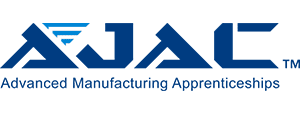Common Questions About Apprenticeship
Apprenticeship is often referred to as the original four-year degree. It combines supervised on-the-job training with classroom instruction and is a proven way to train people for careers in the advanced manufacturing industries. Apprentices earn a wage while they learn on-the-job from a mentor and attend class one night a week at a local community or technical college.
During the on-the-job training portion (93%), the apprentice:
- Is matched with a Journey-Level worker to learn the skills of an occupation
- Learns and practices progressively challenging tasks of the occupation
During the classroom instruction portion (7%), the apprentice:
- Attends class, usually one night per week, studying theory and practical application in class, taught by Journey-Level teachers, at a local community or technical college
- Uses the classroom work to prepare for more challenging tasks on the job
Upon completion of the program (typically 1.5 to 5 years) an apprentice receives a Journey-Level Certificate that is nationally recognized in their chosen trade. Through the apprenticeship program offered by AJAC, an apprentice receives college credit that can be applied towards an associate’s degree.
Registered apprentices:
- Work at a full-time job while training with a mentor
- Earn a living wage plus benefits
- Attend class only one night per week and have no college loans to pay back at the end of your program
- Earn credit towards an Associate’s Degree that can turn into a four-year degree
- Earn a transferable journey-level certificate
- Usually advance more rapidly than other workers – higher-paying jobs come more quickly
- Only pay half of tuition costs for classes
- May receive tuition reimbursement (depending on the employer)
Upon successful completion of AJAC’s apprenticeship program, you will receive a Journey-Level Certificate confirming that you have been trained in all aspects of an occupation and have met the requirements for program completion. This Journey-Level Certificate is nationally recognized and certified by the Washington State Department of Labor & Industries (the governing body of apprenticeships in Washington State).
Apprentices will also receive an official certificate of completion from AJAC along with a CPR/First-Aid certification.
An AJAC apprentice can be anyone newly entering the workforce, looking to upgrade current skills, or already working in an occupation.
AJAC is committed to creating methods for diverse peoples to get trained in a skill that will provide them with a means to achieving a living wage job. To assure success in achieving a high level of diversity among apprentices, AJAC strives to remove barriers and challenges that would otherwise keep someone from becoming an apprentice. AJAC partners with Washington State organizations that provide training and support to gain skills to be successful in the trades.
AJAC and our Registered Training Agents comply with the Equal Employment Opportunity (EEO) requirements of the Washington State Apprenticeship and Training Council (WSATC) and the US Dept of Labor’s Equal Opportunity regulation 29 CFR Part 30, and are dedicated to providing EEO in all areas without regard to an individual’s race, color, national origin, sex, religion, sexual orientation, age, disability, or veteran status. All people are encouraged to apply.
Make sure that you are ready for apprenticeship and have the skills that will drive you to succeed. The qualifications and skills include:
- At least 16 years of age
- High school graduate, or have a GED or are working toward a GED with proof of successful completion of the GED within 6 months of entering the apprenticeship
- Successfully passed college Math and English classes (090 or greater) or completed an assessment test such as the:
- World of Work Inventory (WOWI) with minimum scores of 27.78 in numerical, 34.95 in verbal
- Compass Test with minimum scores of 67 in reading, 32 in writing, and 53 in pre-algebra
- ASSET Test with minimum scores of 37 in reading skills, 37 in writing skills, and 43 in numerical skills
- A solid foundation in Algebra, Geometry and Trigonometry
- Mechanical aptitude (Experience in auto or engine repair, woodworking, metalworking, etc.)
- Knowledge of or experience in the production process, such as meeting deadlines, following directions, achieving goals, measuring, etc.
AJAC’s apprenticeship programs range from 18-months to 5-years—depending on the occupation you enrolled in. Apprentices must complete all of their on-the-job training hours and AJAC classes to earn their journey-level card and certificate of completion.
An apprentice’s hourly wage will vary on their experience, the occupation they are enrolled in, their employer, and location of their job site.
An apprentice is usually brought on as a full-time employee who is learning while earning a paycheck. Advanced manufacturing apprentices start out earning 60% of the Journey-Level wage rate. About every six months, the employer evaluates the apprentice in both related classroom instruction and on-the-job-training (OJT). If the apprentice demonstrates satisfactory progress in both areas, the employer will recommend advancement to the next pay level.
Upon completion of the required course work and OJT, the apprentice will graduate to be a Journey Level worker and will be paid at the entry-level Journey-Level wage rate. Journey-Level workers are well-paid employees in the advanced manufacturing industries and have unlimited opportunities to become supervisors, leads or shop foremen.
AJAC’s apprenticeship programs are located across Washington State and Idaho in counties such as King, Franklin, Grant, Pierce, Snohomish, Spokane, Whatcom, Skagit, Yakima, Clark, Chelan and Kootenai counties. AJAC apprentices take classes one night a week at a community/technical college, skills center or high school, and receive on-the-job training (OJT) during the day at a company’s job site.
- Sign an Apprenticeship Agreement with AJAC and abide by the AJAC Standards of Apprenticeship
- Pay half of the community college tuition (depending on company reimbursement policy)
- Commit to the program for its full duration
- Work the required work hours while receiving on-the-job training
- Demonstrate progress on the job
- Submit monthly work progress reports
- Attend and complete the required supplemental training which is typically held off work hours
Employer responsibilities include:
- Grants equal treatment and training opportunities for all apprentices and apply those conditions uniformly
- Has equipment available and rotates apprentices in the various processes of the skilled occupation
- Identifies (or hires) employees to train in an apprenticeship program
- Identifies a Master Tradesperson to mentor apprentice(s) and maintain the appropriate 1:1 ratio
- Oversees apprentice’s on-the-job training and monitors attendance at related training classes
- Periodically reviews and evaluates apprentices before advancement to the apprentice’s next wage progression
- Pays their apprentices the percentage of Journey-Level wage rate for hours worked
- Commits to retain employee for duration of apprenticeship
AJAC’s responsibilities include:
- Committee is comprised of equal management and non-management (worker) representatives
- Determines the ability of an employer to furnish proper on-the-job training in accordance with the provisions of the Standards
- Grants equal treatment and training opportunities for all apprentices and applies those conditions uniformly
- Develops and maintains related training agreements with appropriate training institutions
- Advocates for advanced manufacturing training in Washington State
- Recruits instructors to teach the classroom training
- Reports apprentice OJT and college course progress and status to L&I Apprenticeship Section
- Tracks apprentice OJT and college course hours
- Representation and accountability to the WSATC and L&I Apprenticeship Section
- L&I Apprenticeship Section compliance reviews, including EEO guidelines and Fair Labor Standards

